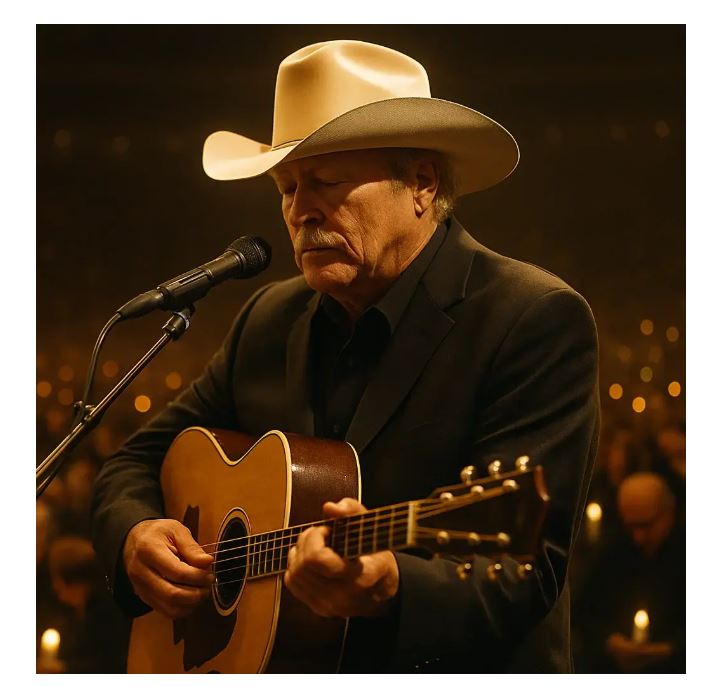
In the world of country music, there are few artists whose voices carry the weight of history, faith, and raw human emotion quite like Alan Jackson. Known for his timeless classics and his ability to speak directly to the heart of ordinary people, Jackson has never been about glitz or chasing trends. Instead, his music embodies honesty, humility, and storytelling. And recently, in a deeply emotional setting, Jackson reminded the world why he remains one of the most authentic voices in music.
At a memorial gathering in Glendale, Arizona, attended by nearly 90,000 people, the spotlight wasn’t on fame, celebrity, or spectacle—it was on grief, remembrance, and shared humanity. The gathering was to honor Charlie Kirk, a man whose life had touched many. But before that massive crowd event, in a much smaller and more intimate ceremony in Nashville, Alan Jackson delivered a moment that will forever be remembered as one of the most heartfelt tributes of his career.
A Song of Mourning and Healing
In Nashville, surrounded by family, friends, and close supporters, Alan Jackson stood quietly before the crowd. There were no flashy lights or dramatic stage setups, just Jackson and his guitar. With a tender voice that carried both strength and vulnerability, he began to sing “Where Were You (When the World Stopped Turning).”
This wasn’t just a performance—it was a prayer in the form of music. Written in response to the tragic events of September 11, 2001, the song has long been associated with collective grief and reflection. Its lyrics speak not to anger or politics, but to faith, compassion, and the simple truths that bind humanity together. In this moment, Jackson repurposed the song as a farewell—an offering of peace, comfort, and healing for those mourning Charlie Kirk.
As the first chords rang out, the atmosphere in the room shifted. People were silent, holding onto every word, many with tears in their eyes. Jackson’s voice trembled at times, his own emotions evident, but his delivery was steady and deeply sincere. This wasn’t the Alan Jackson of sold-out arenas or televised award shows—it was a man using his gift to help others carry their pain.
The Power of Presence Over Performance
What made this tribute so powerful wasn’t vocal perfection or showmanship. It was the complete absence of pretense. Alan Jackson wasn’t there to entertain; he was there to grieve with everyone else. His humility shone through as he let the words of the song do the work.
Unlike many public performances where applause punctuates each song, this tribute ended in profound silence. No one clapped. No one cheered. Instead, the room was filled with reverence, reflection, and the unspoken weight of loss. That silence was louder than any ovation, because it honored both Charlie Kirk’s memory and the depth of emotion Jackson had stirred.
A Community United by Song
The impact of Jackson’s tribute didn’t remain within the four walls of that Nashville gathering. Word spread quickly, amplified by social media. Attendees described the moment as “holy,” “healing,” and “like a prayer.” Clips of the performance circulated online, reaching countless people who were not physically present but still felt connected to the shared mourning.
In Glendale, at the larger memorial where tens of thousands gathered, the memory of Jackson’s song hung in the air. Though the event itself was filled with speakers, tributes, and memories, people whispered about the Nashville performance as if it were the emotional centerpiece of the farewell. Music, after all, has a way of traveling beyond physical spaces—it lives in hearts, conversations, and collective memory.
Alan Jackson’s Legacy of Faith and Humility
For decades, Alan Jackson has been known as more than just a country music star. He is a storyteller, a man of faith, and an artist who understands that music is most powerful when it’s grounded in truth. His career has been built not on chasing chart positions or viral trends, but on connecting with people through authentic, relatable songs.
From classics like “Remember When” to gospel-inspired tracks, Jackson’s discography is a testimony to family, faith, and the human condition. His tribute to Charlie Kirk reinforced this legacy, proving once again that music can comfort, unify, and transcend.
At a time when many performances are polished productions aimed at maximizing attention, Jackson chose simplicity. His trembling yet steady voice, his humility, and his willingness to lay his heart bare turned a simple song into something extraordinary.
Why This Tribute Resonated So Deeply
There are a few reasons why Alan Jackson’s farewell to Charlie Kirk struck such a powerful chord:
- Authenticity Over Showmanship: Audiences can sense when an artist is genuine. Jackson didn’t attempt to put on a grand show—he simply let the music speak.
- A Song With History: “Where Were You” is already deeply tied to national grief and collective healing. Its themes of faith and compassion made it a perfect vehicle for this tribute.
- Shared Experience: Everyone in the room was united in mourning. Jackson’s song became a vessel through which their grief could find expression.
- Spiritual Undertones: More than just a performance, the moment felt like worship, like a prayer offered up on behalf of everyone grieving.
A Farewell That Will Be Remembered
As time passes, people may forget the exact words spoken at Charlie Kirk’s memorial. They may not remember every detail of the large gathering in Glendale. But they will remember Alan Jackson’s trembling voice, his quiet humility, and the silence that followed his song.
This wasn’t just another performance—it was a defining moment, one that reminded us of music’s ability to transcend entertainment and step into the sacred. It showed that even in sorrow, beauty can be found, and that sometimes, the greatest gift an artist can give is not applause, but comfort.
Final Thoughts
Alan Jackson’s tearful tribute to Charlie Kirk wasn’t about celebrity, headlines, or even the song itself. It was about love, loss, and the healing power of music. It was about one man using his voice not for fame, but for comfort. And in doing so, he gave everyone present a gift they will never forget.
In the end, the silence that followed was not empty. It was full—full of respect, full of grief, and full of gratitude for both Charlie Kirk’s life and Alan Jackson’s heartfelt farewell. And in that silence, the true power of music was revealed.
